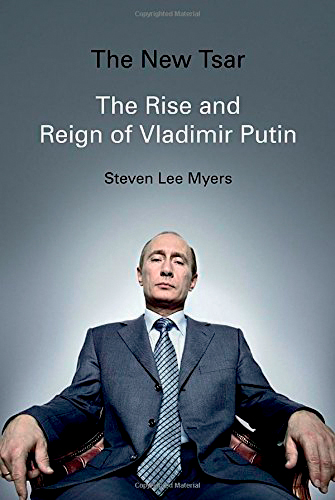The birth, education and origins of Vladimir Putin to better understand his aims, his politics and the charm he wields over the rest of the world.
Steven Lee Myers, a New York Times journalist and former correspondent in Moscow, has written a book that is direct and uncompromising, reflecting the man whose story it seeks to narrate. The New Tsar: The Rise and Reign of Vladimir Putin contains all the excitement and intrigue of a James Bond film, but the protagonist is far more controversial.
Enigmatic, complex, Machiavellian, calculating: these are just some of the adjectives that have been used to describe Putin. Taken together, they paint a portrait of a politician that never fails to astonish observers of international politics. One quote in particular stands out. Speaking in Sochi in October of last year (but the sentiment is evidently often repeated to those in his entourage), Putin said, “Fifty years ago, the streets of Leningrad taught me one thing: if a fight’s inevitable, you must strike first”. In the pages of Myers’ book, Putin is depicted exactly in these terms. His early years were far from privileged. But from his education in Leningrad to his enrolment in the KGB to his political rise, everything was planned down to the smallest detail. As much as he is controversial, it is difficult not to be fascinated by a man that has accomplished so much under his own steam, achieving all that there was to achieve and more, sometimes through the use of force and sometimes not.
Myers is convinced that behind Putin’s decisions, including those relating to Crimea, is a plan that has been drawn up for some time: “Putin loves the Russian Federation. He loves Russia. He has seen the disintegration of ‘his’ Soviet Union and he has decided to rebuild it, in a different way”. The fatherland above all else, whatever the cost, above every convention, above any single rule. Putin’s actions always prioritise the national interest. Even when it means making unpopular decisions on the international front, leading to sanctions that are burying the domestic economy, Putin is less concerned about next year than he is about the next 20 years.
Planned success, both political and administrative, is the mantra of the former KGB functionary. This was the case when he was prime minister in 1999 as well as during his first mandate as president of the Russian Federation. The legacy of the past, of his poor upbringing, has undoubtedly contributed to his constant quest for power. But this quest is not greater than his love for the fatherland, notes Myers.
Putin’s desire to rebuild a Great Russia can be found on every page of the book. His rhetoric when he talks of Crimea or the relationship with the US also expresses this sentiment in spite of sanctions and condemnation from the international community. In fact, Putin wants to cultivate an external enemy because he knows that in order to manage power, one needs an antagonist. Now the US, now Europe, tomorrow, who knows? There is, however, an aspect of Myers’ book which is strikingly lacking: the question of how Russians feel about Putin.
This query was also raised by Gal Beckerman in The New York Times. Myers’ biography is indeed compelling and detailed, but even for the most casual reader, it is unclear why no space has been allocated to the views of those living in Russia today. What has been and continues to be the influence of “The New Tsar” on the citizens of Russia? To what extent is information free in Moscow and its surroundings? These missing questions are perhaps the fault of the psychological hold that Putin seems to elicit: a person so gifted with an allure from another time, but one that is questionable in equal measure.
The New Tsar: The Rise and Reign of Vladimir Putin
Steven Lee Myers, 572 pp. Alfred A. Knopf. $32.50
The birth, education and origins of Vladimir Putin to better understand his aims, his politics and the charm he wields over the rest of the world.
Steven Lee Myers, a New York Times journalist and former correspondent in Moscow, has written a book that is direct and uncompromising, reflecting the man whose story it seeks to narrate. The New Tsar: The Rise and Reign of Vladimir Putin contains all the excitement and intrigue of a James Bond film, but the protagonist is far more controversial.




